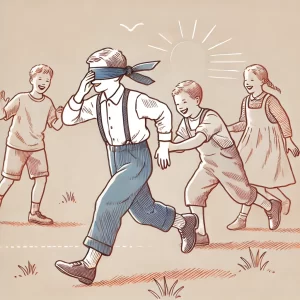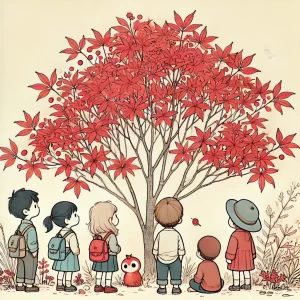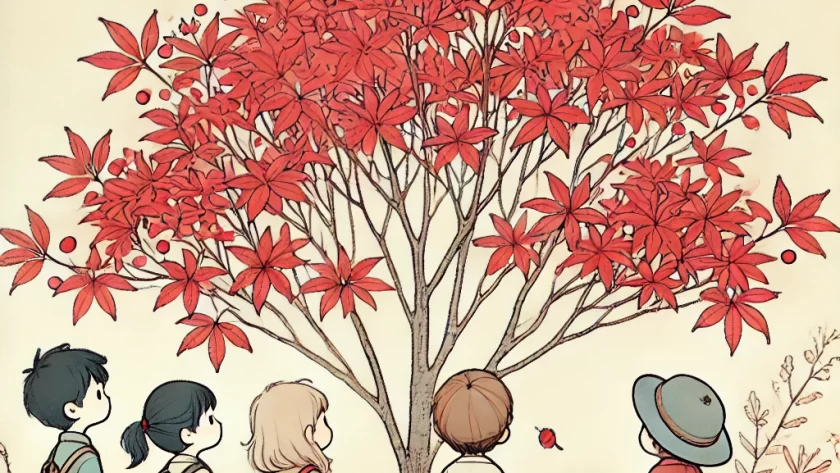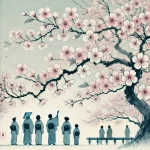ちいさい秋みつけた [Chīsai Aki Mitsuketa]
Words : サトウハチロー [SATŌ Hachirō]
Music : 中田喜直 [NAKADA Yoshinao]
This time, I’d like to introduce a children’s song that adults can also enjoy—a perfect song for the Japanese autumn.
“ちいさい秋みつけた / Chīsai Aki Mitsuketa” was written in 1955 by Hachirō Satō and Yoshinao Nakada.
Older children’s songs are often referred to under the genre name “童謡 / dōyō” (children’s songs).
だれかさんが だれかさんが
dareka san ga dareka san ga
だれかさんが みつけた
dareka san ga mitsuketa
- 誰か(だれか) [dareka] : someone
- 見つける(みつける) [mitsukeru] : find
(translation) “Someone, someone,
someone found it.”
The word “さん / san” is an honorific used after names, and attaching it to “誰か / dareka” (someone) makes the expression a bit cuter.
This song includes prefixes and suffixes that are suitable for a children’s song. Please refer to the link.
ちいさい あき ちいさい あき
chiisai aki chiisai aki
ちいさい あき みつけた
chiisai aki mitsuketa
- 小さい(ちいさい) [chiisai] : small
- 秋(あき) [aki] : autumn
(translation) “A small autumn, a small autumn,
a small autumn, I found it.”
Thanks to Japan’s surrounding natural environment, the four seasons are quite distinct. Autumn is characterized by the changing colors of the leaves, the crisp air, and the sounds of autumn insects, all of which the Japanese enjoy. There are also many subtle changes in our daily lives that signal the shift from summer to autumn. This song portrays a scene of finding such small changes, finding a small autumn.
めかくしおにさん ての なるほうへ
mekakushi oni san te no naru hō e
- 目隠し(めかくし) [mekakushi] : blindfold
- おに [oni] : demon, tagger (in a game)
- 手(て) [te] : hand
- 鳴る(なる) [naru] : sound
- 方へ(ほうへ) [hō e] : towards
“目隠しおに / mekakushi oni” is a traditional Japanese children’s game similar to blind man’s buff wiki, where a blindfolded person chases others. There’s a related rhyme that goes:
おにさんこちら てのなるほうへ
onisan kochira te no naru hō e
“Oni-san over here, towards the sound of clapping hands”
which has almost the same meaning as the lyrics here.

すました おみみに かすかに しみた
sumashita omimi ni kasuka ni shimita
よんでる くちぶえ もずの こえ
yonderu kuchibue mozuno koe
- すます [sumasu] : sharpen
- 耳(みみ) [mimi] : ear
- かすかに(かすかに) [kasuka ni] : faintly
- しみる(しみる) [shimiru] : pierce
- 呼ぶ(よぶ) [yobu] : call
- くちぶえ(くちぶえ) [kuchibue] : whistle
- もず [mozu] : shrike (a type of bird)
- 声(こえ) [koe] : voice, sound
(translation) “To sharp ears, it faintly pierced.
A calling whistle, the shrike’s cry.”
When playing blind man’s buff, your sense of hearing becomes sharper. You hear the voice calling “te no naru hō e” from afar, along with the faint sound of a whistle and the call of the shrike.
ちいさい あき ちいさい あき
chiisai aki chiisai aki
ちいさい あき みつけた
chiisai aki mitsuketa
Next is the second verse.
だれかさんが だれかさんが
dareka san ga dareka san ga
だれかさんが みつけた
dareka san ga mitsuketa
ちいさい あき ちいさい あき
chiisai aki chiisai aki
ちいさい あき みつけた
chiisai aki mitsuketa
おへやは きたむき くもりの ガラス
oheya wa kitamuki kumori no garasu
うつろな めのいろ とかした ミルク
utsurona me no iro tokashita miruku
わずかな すきから あきの かぜ
wazuka na suki kara aki no kaze
- 部屋(へや) [heya] : room
- 北向き(きたむき) [kitamuki] : north-facing
- くもり(くもり) [kumori] : cloudy
- ガラス(がらす) [garasu] : glass
- うつろな [utsurona] : vacant, hollow
- 目(め) [me] : eye
- 色(いろ) [iro] : color
- とかす [tokasu] : to melt
- ミルク(みるく) [miruku] : milk
- わずかな [wazuka na] : slight
- 隙(すき) [suki] : gap
- 風(かぜ) [kaze] : wind
(translation) “The room faces north, with cloudy glass,
vacant eyes, milk melted,
a slight breeze of autumn through the gap.”
The north-facing room feels a bit cold, and it’s easy to imagine a scene where someone is warming up by drinking milk.
ちいさい あき ちいさい あき
chiisai aki chiisai aki
ちいさい あき みつけた
chiisai aki mitsuketa
Next is the third verse.
だれかさんが だれかさんが
dareka san ga dareka san ga
だれかさんが みつけた
dareka san ga mitsuketaちいさい あき ちいさい あき
chiisai aki chiisai aki
ちいさい あき みつけた
chiisai aki mitsuketa
むかしの むかしの かざみの とりの
mukashi no mukashi no kazami no tori no
ぼやけた とさかに はぜのは ひとつ
boyaketa tosaka ni haze no ha hitotsu
はぜのは あかくて いりひいろ
haze no ha akakute irihiiro
- 昔(むかし) [mukashi] : old, past
- 風見鶏(かざみどり) [kazamidori] : weathercock
- ぼやけた [boyaketa] : blurred
- とさか [tosaka] : comb (on a bird’s head)
- はぜ [haze] : wax tree
- 葉(は) [ha] : leaf
- ひとつ [hitotsu] : one
- 赤い(あかい) [akai] : red
- 色(いろ) [iro] : color
(translation) “Long ago, on the weathercock, a blurred comb, a single leaf of the wax tree, the wax tree leaf is red, the color of sunset.”
“いりひいろ / irihiiro” is a word coined by Hachirō Satō, meaning the color of sunset.
He was inspired by the sight of the red leaves of the wax tree in his garden when writing this song.
ちいさい あき ちいさい あき
chiisai aki chiisai aki
ちいさい あき みつけた
chiisai aki mitsuketa
When summer ends, it feels like the lively fun of children’s summer vacation is over, the noise of the cicadas fades, and everything suddenly becomes quiet. The humidity also drops, and the air becomes crisp and clear. While this brings a sense of refreshment, there’s also a slightly melancholic atmosphere. This is the essence of Japanese autumn. The slightly sad melody enhances the autumnal mood.

Although it wasn’t initially released as a record, it became well-known after being recorded by the male chorus group Bonny Jacks in 1962. Bonny Jacks are famous for singing folk songs and children’s songs from around the world.
Thanks for reading! Feel free to comment if you have any feedback or questions.
Follow me on X.



